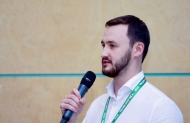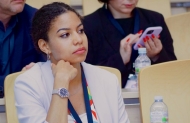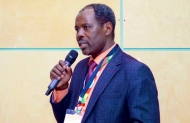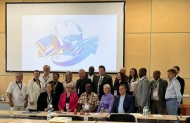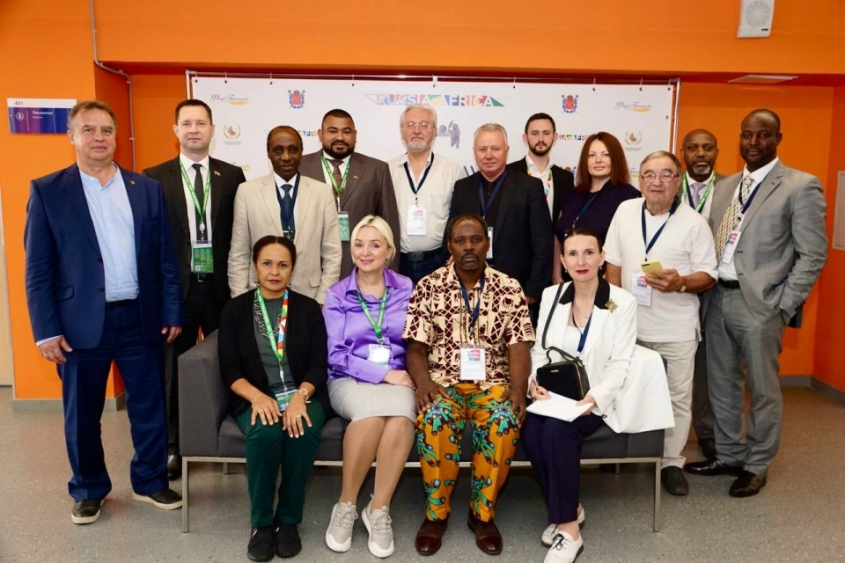
On July 27 - 28, 2023, on the sidelines of the Second Russia-Africa Summit at the site of the National Research University – Higher School of Economics in St. Petersburg, the first Forum of African Alumni of Russian and USSR Universities took place. The Forum was initiated by the African Diaspora Union for Truth and the Improvement of the Condition of People of African Descent” (FAVRIS) (Inganzo Gakondo).
The International Union of Non-Governmental Organizations "Eurasian Peoples' Assembly" took an active part in the preparation and work of FAVRIS. The forum was held thanks to the Alexander Gorchakov Public Diplomacy Fund.
The motto of the event is “Dialogue of Civilizations. Africa - the path to justice, preserving traditions” and cross-cutting issues of the discussion “Culture, Peace and Security” echoed the central agenda of the Summit. In particular, the Forum touched upon the global issues of saving human civilization, the causes of existing conflicts and possible ways to resolve them, the role of public diplomacy institutions in the formation of new strategic initiatives and their implementation in order to achieve the multifaceted rich potential of Russia's relations with African countries.
The discussion included such significant public diplomacy topics as the expansion of sister city relations; contacts between people, non-governmental organizations, including youth ones; participation in professional training programs, academic and student exchanges, the study of the Russian language in African countries, as well as the development of Russian African studies; strengthening diverse cultural ties in order to achieve mutual understanding and mutual acquaintance with the unique traditions and historical heritage of the peoples of Russia and Africa; development of exchanges of sports delegations; promotion of cooperation in tourism, etc.
Particular attention was paid to the formation of the philosophy of the new Man-Creator and the society of Humanity, as the main component of the process of survival of human civilization.
Representatives of the Eurasian Peoples' Assembly acted as experts of the Forum.
Sergey Sanakoev, President of the ANO "Center for Research and Forecasts of the Development of the Asia-Pacific Region", Deputy Secretary General of the Eurasian Peoples' Assembly at the International Forum of African Graduates of Russian and Soviet Universities in his speech paid special attention to building a dialogue based on respect for traditions, culture, which, according to the expert, is also a key condition for building a security system aimed at shaping the future:
“We are residents of one global village. Certainly, in today's world one civilisation cannot dictate how one should live one's life. There are older civilizations in the world. Our traditions, our culture has just as much right as others’ to shape our opinions on how we should develop. <...> Today, the Forum and our interaction demonstrate that we are able and willing to negotiate, and wish our future generations the best. We would like to be heard around the world and create such a security system that would allow us to turn to a brighter future and prepare our children accordingly.”
Yulia Petrova, Deputy Secretary General of the Eurasian Peoples' Assembly, Professor of the Financial University under the Government of the Russian Federation, Candidate of Economic Sciences presented projects and cooperation programs of the Eurasian Peoples' Assembly in science and education, public diplomacy on the sidelines of the International Forum of African Alumni of Russian and Soviet Universities.
“We are collaborating with many universities, including universities that have UNESCO Chairs. We consider them as an innovative international scientific and educational center within the university, which can help expand international cooperation programs. The Eurasian Peoples' Assembly can offer interesting projects and cooperation programs, scientific diplomacy programs. We have strategic partners. For example, the Association of Arab Universities is 22 countries of the Arab Gulf, 450 universities are an authoritative educational international organization. I think the experience of our partnership with these universities is unique and interesting, so we are extending it to African countries. <...> The Eurasian Peoples' Assembly is implementing a project on scientific diplomacy with the support of the A.M. Gorchakov Fund “Smart solutions for East-West cities”. In the autumn in Belgorod, at the forum of public diplomacy, international research groups will present their projects in the presence of experts from 18 countries. For undergraduates, graduate students, these are points in the portfolio, the opportunity to publish. We would like to offer all this to our African partners. <...> The Eurasian Peoples' Assembly is the only international organization in Russia today that has a UN mandate to conduct an independent dialogue on the development of food systems and food security. And we need to move forward together.”
Yuri Palamarchuk, Deputy Secretary General of the Eurasian Peoples' Assembly, Head of the Representative Office of the Eurasian Peoples' Assembly in the Leningrad Region, spoke about projects in public diplomacy that are in demand and are successfully implemented in the Greater Eurasia space with its direct participation and in partnership with a wide range of organizations. He outlined the role of humanitarian interaction and humanitarian projects:
“Until now, it has been generally accepted that the economic issues of twinning cooperation are of paramount importance, and the issues of humanitarian interaction are in the background. In my opinion, it is precisely humanitarian cooperation that can now help diplomacy "pull out" issues that are either at an impasse or require a prompt solution in the future. <…> Three pillars of humanitarian cooperation. We are talking about sister city cooperation. The first whale is the opportunity to implement humanitarian projects, expanding the circle of participants from small communities to large metropolises. The second whale is the golden key to the door that allows you to start humanitarian projects for implementation in certain cities. The third pillar is that this cooperation prepares grounds and creates motivation that allows to bring countries, regions, provinces into practical co-operation.”
Natalia Zabolotskikh, Deputy Head of the General Secretariat of the Eurasian Peoples' Assembly, political scientist, media technologist, dwelled on the importance of media communications through Russia-Africa interaction, spoke in detail about the opportunities provided by the International Competition "Leader of People's Diplomacy". The competition is implemented by the Assembly of the Peoples of Russia in partnership with the Eurasian Peoples’ Assembly with the support of the Presidential Grants Foundation. The expert made a proposal to the representatives of African countries to engage in media content exchange activities in key areas of cooperation: science, education, culture, business and to form a media platform "Voice of Greater Eurasia":
“Information cooperation between our country and African countries is an important part of the formation of the basis of security in the emerging multipolar world. According to the NAFI Analytical Center and the Roscongress Foundation, the majority of Russians demonstrate poor awareness of the African continent, while 75% of Russians want to receive more data. The most popular channels for getting information about Africa are television (51%), social networks and blogs (35%), and online media (27%). Information products created by the Russian media often do not reach potential users of the African continent. The vacuum is filled with one-sided information from other players in the media market, and the picture formed by some media devalues the long traditions of interaction between Russia and Africa. African media are owned by Western concerns and repeat their news series. The expansion of the correspondent network of Russian media in African states could influence the one-dimensionality of the world information field. The preparation of high-quality media content and active exchange are important here.”
Igor Shpynov, Head of the Department for the Preservation of Historical Memory of the Eurasian Peoples’ Assembly, member of the Public Council at the Representative Office of the Leningrad Region under the Government of the Russian Federation, focused on the formation of a “new building of global peace”, the role of economics and communications in building a multipolar world:
“Today, the bricks of a new building of global peace are being laid. <...> The basis for the dialogue of civilizations will be economic. The key problem is the creation of alternative financial models.” Civilization directions cannot be developed without communication. <...> Original culture, creativity is the basis for the development of human civilization and it must be preserved. The Eurasian Peoples’ Assembly is holding a number of major events that can become a great communication platform for developing relations with African countries.”
Ilya Shakalov, General Director of the Krasnodar Territory Development Fund, municipal deputy, finalist of the Leader of Public Diplomacy project, partner of the Eurasian Peoples' Assembly:
“Our Fund is proud of its partnership with the Eurasian Peoples' Assembly. We express our gratitude to our partner, which already includes almost a hundred participating countries and helps to establish cooperation not only in the humanitarian sphere, but also to identify needs in order to build an economy together. <...> We have restructured the format of organizing business missions and included a large humanitarian component. Today's Russia-Africa forum emphasizes that in addition to the economy culture, education, science and technology occupy a large layer. <...> The issue of developing sister city relations between cities and universities is the main one today, because public, state diplomacy is now “lame” due to various restrictions, some nuances. And public diplomacy can bypass them and offer really the format of interaction that is convenient and brings real benefits."
The forum brought together more than 200 participants from Burundi, Tanzania, Benin, Zambia, Sudan, CAR, Rwanda, Burkina Faso, Morocco, Mauritania, Congo, Côte d'Ivoire, Uganda, Ghana, Egypt, Kenya, Senegal, Togo, Chad, Nigeria, Mali, Sierra Leone, Belarus and Russia.
Based on the results of FAVRIS, decisions were made to complete the organizational issues for the consolidation of African graduates of universities in Russia and the Soviet Union both in Eurasia, Africa and other continents. By decision of the Forum, the initiative group was headed by Francois Xavier Tulikunkiko (Rwanda).



